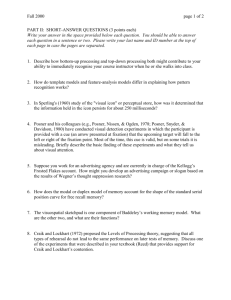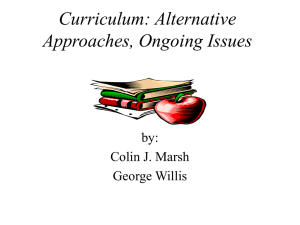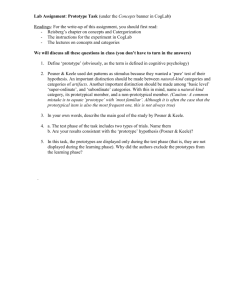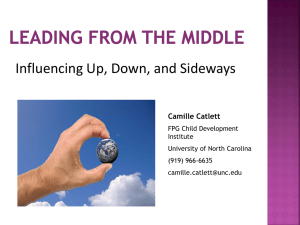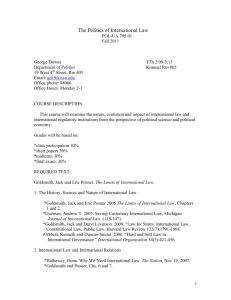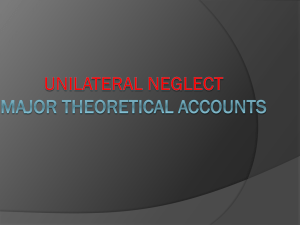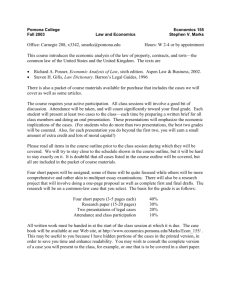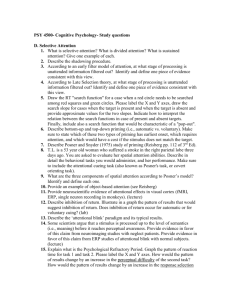Elisabeth Krecké, Economic Analysis and Legal
advertisement
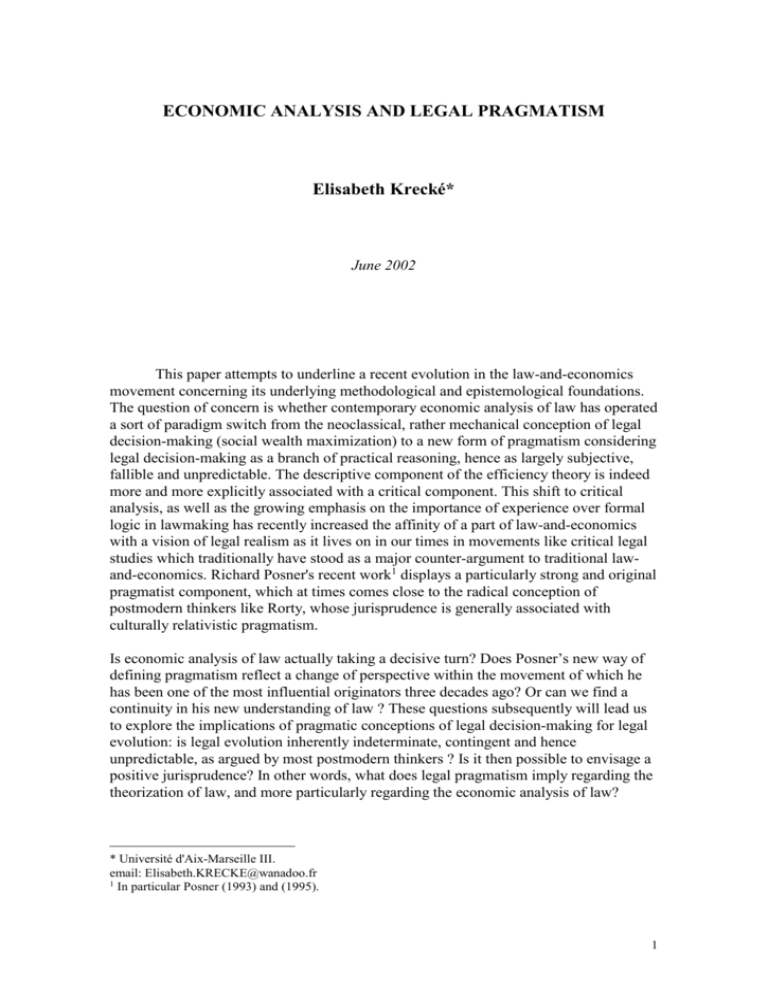
ECONOMIC ANALYSIS AND LEGAL PRAGMATISM Elisabeth Krecké* June 2002 This paper attempts to underline a recent evolution in the law-and-economics movement concerning its underlying methodological and epistemological foundations. The question of concern is whether contemporary economic analysis of law has operated a sort of paradigm switch from the neoclassical, rather mechanical conception of legal decision-making (social wealth maximization) to a new form of pragmatism considering legal decision-making as a branch of practical reasoning, hence as largely subjective, fallible and unpredictable. The descriptive component of the efficiency theory is indeed more and more explicitly associated with a critical component. This shift to critical analysis, as well as the growing emphasis on the importance of experience over formal logic in lawmaking has recently increased the affinity of a part of law-and-economics with a vision of legal realism as it lives on in our times in movements like critical legal studies which traditionally have stood as a major counter-argument to traditional lawand-economics. Richard Posner's recent work1 displays a particularly strong and original pragmatist component, which at times comes close to the radical conception of postmodern thinkers like Rorty, whose jurisprudence is generally associated with culturally relativistic pragmatism. Is economic analysis of law actually taking a decisive turn? Does Posner’s new way of defining pragmatism reflect a change of perspective within the movement of which he has been one of the most influential originators three decades ago? Or can we find a continuity in his new understanding of law ? These questions subsequently will lead us to explore the implications of pragmatic conceptions of legal decision-making for legal evolution: is legal evolution inherently indeterminate, contingent and hence unpredictable, as argued by most postmodern thinkers ? Is it then possible to envisage a positive jurisprudence? In other words, what does legal pragmatism imply regarding the theorization of law, and more particularly regarding the economic analysis of law? * Université d'Aix-Marseille III. email: Elisabeth.KRECKE@wanadoo.fr 1 In particular Posner (1993) and (1995). 1 1. The pragmatist shifts of law-and-economics Traditionally, legal pragmatism has been associated essentially with legal realism. It has been rooted in pragmatist philosophy2, itself resulting from heterogeneous, mostly interdisciplinary, scientific traditions. After a short period of success, legal realism as well as philosophical pragmatism almost entirely disappeared by the end of the second world war, the first largely replaced by analytic philosophy, and the second absorbed into mainstream legal thought3. In recent years, legal pragmatism finally experienced an interesting revival with postmodern philosophies like neo-pragmatism, critical legal studies, and a growing part of recent law-and-economics. 1.1. The pragmatism of early law-and-economics Legal pragmatism has become a widely used term with different and sometimes contradictory meanings. It can be argued that economic analysis of law has always adopted a pragmatic approach, but its pragmatism has undergone important changes over time. Law-and-economics is an intrinsically pragmatic approach, be it only in the sense that its goal - understanding how courts work and what are their effects on individual behavior- is in itself a realist maxim. Furthermore, the underlying logical positivism requires a validation of theory through a confirmation by reality. The traditional method of law-and-economics consists indeed of building a coherent and refutable theory of legal rules, processes and institutions, which in a next step is supposed to be confronted to the empirical world. In this perspective, only empirical investigations can refute or confirm the hypotheses derived from the theory. Thus, the arguments for wealth maximization advanced by the first generation of lawand-economics have essentially been pragmatic. They are built on the empirical observation that over centuries, most common law judges have developed an intuitive sense of economics and that legal decisions and doctrines are most adequately described as an explicit or at least an implicit application of the principles of social wealth maximization or social cost minimization4. Lawmaking in this approach is a matter of calculus, management, resource allocation, optimization and improvement. Strongly influenced by the spirit of utilitarianism, early law-and-economics has undeniably started out as an instrumental and practical view of law, contrasting with the formalism and conceptualism of a large part of mainstream legal scholarship. The hostility toward the principles of justice, fairness or equity displays another strong pragmatist feature of the initial law-and-economics movement. The purpose is to develop a scientific and anti-dogmatic approach to law. This is why the first generation of writers, faithful to the logic of neutrality and objectivity characterizing mainstream microeconomics generally, refused to introduce normative and ideological considerations into their inquiries of the legal decision-making process. The initial 2 as originated in the late 19th and early 20th centuries among others by Peirce, James, Dewey and Mead. Posner (1993), 462. 4 For instance, Posner (1977), Kronman (1978), Landes and Posner (1981). See Rubin (1977) for the evolutionary version of descriptive economic analysis of law. 3 2 literature, of which Posner can be considered as one of the emblematic figures, is thus in the beginning limited essentially to descriptive analysis. It is interested in the way the law is and how it evolves, rather than how it ought to be. According to this perspective, ethics is considered as a subjective, rhetorical and arbitrary matter and there is no scope for it in economics. Law-and-economics pushed the quest for objectivation even further than traditional economists by denying any link not only between economics and ethics, but also between law and ethics. The reasons of this skepticism are themselves fundamentally pragmatic: first, taking into account complex moral or ethical aspects would risk to unnecessarily encumber the theoretical investigation into the legal process. Abstraction and reductionism are considered as essential features for a theory to work5. Second and related argument, any concept that cannot be quantified, formalized or objectively defined is considered as a suspect, futile and unusable value. Justice is such a concept. Considered as an emotive, intuitive and irrational principle, justice is discarded for being a useless device for legal practice as well as for the scientific inquiry into the law. At the same time, as previously mentioned, the generally advanced justification of the wealth maximization principle is that it is an operational criterion, and therefore particularly useful for understanding the functioning and evaluating the soundness of legal decision-making6. That this criterion is derived from economics and not at all from the law is not a preoccupation in this pragmatic and descriptive perspective and hence does not call for any deeper argumentation. What is of interest is simply to see whether and how legal decisionmakers use this criterion. It is precisely on this point that the pragmatism of early law-and-economics poses a problem. Indeed, the serious lack of empirical verification (mainly due to informational problems and lack of relevant data) made it difficult to support the theory according to which in real life, legal decision-making is systematically based on the narrowly defined efficiency criterion7. Furthermore, in many cases, legal practice happens to refute this assumption8. The difficulties to empirically verify the descriptive thesis may explain why the law-and-economics movement has progressively shifted from an explanatory to a prescriptive theory. If it is not possible to prove by observation that the common law is efficient, an alternative is to state that it ought to be efficient. Wealth maximization then becomes a normative principle for guiding legal policy. This is how at least part of the literature came to mask the gap that became apparent in the theory because of the failure of empirical work to confirm it. 1.2. From pragmatism to a form of legal formalism Like descriptive theory, the normative conception - brought forward among others again by Posner9 - started out as a rather pragmatic approach to law. The purpose is to provide As Posner notes, “ if a theory is too rich, it may not be falsifiable - a looming for economics... Maybe economics is not reductionist enough ”. Posner (1993), 366. 6 Posner (1980). 7 Rizzo (1979). 8 Rizzo (1979) and (1980). 9 For instance Posner (1980). 5 3 an instrument that is supposed to improve the legal system, and what counts is whether the instrument works, not where it is grounded. The problem with this approach is, however, that the instrument rather soon turned out to be much less workable than it seemed at first sight. Severe technical and philosophical deficiencies of the KaldorHicks wealth maximization criterion indeed made it appear as a largely unworkable response to legal problems10. Among the widely underlined shortcomings, in particular informational problems largely undermine the methodological foundations of the efficiency theory of law11. This theory may still be labeled pragmatist in the sense that it endeavors to refashion the law into an efficient instrument, but it is a pragmatism that reveals itself largely impracticable. While part of the literature came to absorb many objections and to recognize that the attempts to make wealth maximization an instrument for creating good law have not necessarily been altogether successful, another part operated an important, yet largely unnoticed shift from a logic of means to a logic of ends, by progressively transforming efficiency into a supreme value that ought to be defended for its own sake12. Wealth maximization ceases to be instrumental and becomes foundational. In the modest version of the theory, it becomes a moralism in competition with justice or ethics13, and in the radical version, justice is simply considered as a label for wealth maximization14. Efficiency no longer is viewed as a means in the service of law, but law is seen as a means in the service of the ultimate social goal, efficiency. This evolution is an important shift away from the pragmatist spirit that has prevailed in the initial economic theory of law. It is a shift away from the question of whether the advanced criterion is workable or not (which is a pragmatic concern), and a step towards the systematic defense of social efficiency as a meta-value. While in initial economic analysis of law, every form of moralism had been categorically rejected as a foundation of law, wealth maximization has now become itself such a moralism. At this stage, the theory has been constrained to explain why an extralegal (and more precisely an economic) criterion could be supposed to be more valuable than criteria directly derived from the law. This is definitely not an easy task and attempts to justify the imposition of an economic value upon the law remain exceptions15. This evolution is at the same time an important shift away from anti-formalism and anticonceptualism characterizing the beginning of law-and-economics and a step toward a new kind of legal formalism. As admitted by Posner16 himself, economic analysis of law has ended up replacing legal conceptualism (against which it initially has been a revolt) with economic conceptualism. Legal outcomes are evaluated by their conformity not with some overarching legal concepts (as it is the case in legal formalism), but with not 10 Kronman (1980). Rizzo (1985), Krecké (1996). 12 For example Posner (1977) and Cooter (1987). For a detailed review of this literature, see Krecké (2001). 13 Calabresi (1980). 14 Posner (1977). 15 See for instance Posner (1980). 16 Posner (1995), 2. 11 4 less highly valued principles of economics. It has become an approach that keeps away from the world of facts just as much as does legal formalism, which may explain why law-and-economics is sometimes titled the new Langdellism17. What could be the antidote to this new, disguised form of conceptualism ? 2. Toward a pragmatist reconstruction of law-and-economics ? 2.1. Critique of the law Some leading law-and-economics scholars recently came to admit the dogmatic character that part of the approach has developed. For instance Ulen invites scholars to « leave the cathedral and get to the microscope » - the discipline should quit acting « like a religion and more like a science »18. Reactions within the movement are manifold, reaching from severe self-criticism and devaluation of the efficiency assumption19 to a rather pronounced form of nihilism, which at times comes close to the conclusions of the radical critiques of law brought forward for instance by critical legal studies - a movement which, with the strong emphasis on the biases that systematically pervert the legal system, had always been considered as an anti-thesis of law-andeconomics20. In recent years, authors, who once had been fervent advocates of the lawand-economics approach, indeed brought up a strongly critical conception, which often makes it difficult to formulate any concrete suggestions or plans of action for reforming the legal system21. Posner is one of the rare law-and-economics writers who undertakes to see where the theory still stands after taking into account the sometimes destructive objections, in particular with respect to the limited realism of the traditional, allocative explanation of legal decision-making. His recent writings can be considered as the most representative manifestation of an attitude which consists of turning away from the normative and ideological considerations and instead limiting the focus of analysis exclusively to the world of facts. Unlike the initial economic analysis of law which was preoccupied with providing evidence of the efficiency properties inherent in the common law, Posner now accuses the actual Anglo-American legal system of being too much looking backward rather than forward, and of too much focusing on authority, certitude, rhetoric and tradition and too little on consequences and on extra-legal sources of legal knowledge22. This would imply that the current system does not resemble to what law-and-economics once would have considered as an efficient legal system, in other words, that the 17 In reference to Langdell (Harvard Law School) who has undeniably been the most representative incarnation of traditional American legal formalism. Posner (1993), 442. 18 Ulen (1999), 327-8. 19 For instance Rubin and Bailey (1992), Kobayashi and Lott (1993). 20 Krecké (2001). 21 The neo-traditionalism now brought forward for instance by Kronman (1993) -which is animated by the desire to come back to the common law of the past (as incarnated by the great lawyer-statesmen of the 19th century and their focus on virtues such as integrity, honesty, deliberation...)- may be considered as an exception to the general refusal of most of these nihilistic authors to go beyond critique. But he is himself aware of the illusory and utopian character of this proposal. 22 Posner (1993, 465). 5 assumption of the efficiency of the legal system cannot be maintained any more. According to Posner, it is under the influence of the current academic view (which is all too solemn and self-important) and in particular the way legal education is proceeding that the law has become opaque, dogmatic, theocratic and self-confident23. As legal theory is generally presented essentially from an internal perspective in which law is considered exclusively from the viewpoint and with the terminology of those who operate within the legal system (judges, lawyers...), the probability of the emergence of a critical, external perspective is extremely low24. The typical realist and critical legal approaches to law (like critical legal studies, feminist jurisprudence, critical race theory, or even the just mentioned self-critical approaches recently emerging at the margin of the law-and-economics movement) take a similar look on the current legal institutions, but they generally stop short after underlining the contingency and the fundamental incoherences on which the legal system is built. They usually assess that legal theory has not much more to offer than a radical critique of the law. The sole task of legal theory in this perspective is to underline legal inefficiency. Unlike the critical approaches to law and their essentially negative jurisprudence, Posner still envisages a theory of law predestined to be used as a framework for deciding cases and enacting statutes. He has not given up the idea of a positive jurisprudence. In other words, his analysis starts at the point where the critical approaches usually stop. Does his reference to pragmatism allow him to design a positive jurisprudence ? 2.2. Return to the pragmatist spirit The identification and critical analysis of the deficiencies of the legal system is considered as a fundamental step for the development of this new jurisprudence. Understanding the reasons of the systematic inefficiencies of the legal system is seen as the necessary condition for overcoming them. In this sense, The Problems of Jurisprudence as well as Overcoming Law could both be interpreted as a pragmatic enterprise of reconstruction of the law. In many respects, we might think indeed that Posner’s recent work is still reflecting a rather progressive attitude which consists of criticizing, responding to criticisms and finding ways to make things better. The logic of action and improvement characterizing early law-and-economics is still present. So, even though Posner now seems to refute the traditional assumption according to which there is some sort of invisible hand process that drives the law toward efficiency, it also 23 Ibid., 465. “Within a few months of entering law school the law student has lost the external perspective ”. Ibid, 468. This explains the severe lack of “ a spirit of inquiry, challenge, fallibilism, open-mindedness, respect for fact, and acceptance of change ” in the way law is nowadays produced and analyzed (465). In a system where law is presented “ as something not to be questioned, as something that has always existed and in approximately its contemporary form ”, it is indeed not surprising that “ much of legal scholarship and judicial analysis is unoriginal, unempirical, conventional, and unworldly, overwhelmingly verbal and argumentative (indeed, verbose and polemical), narrowly focused on doctrinal questions, mesmerized by the latest Supreme Court decisions, and preoccupied with minute and ephemeral distinctions -rather than bold, scientific, and descriptive” (468). 24 6 appears at many occasions that he continues to believe that it is important (and eventually possible) to envisage reforms that contribute to enhance the efficiency of law. If efficiency still plays a role in Posner’s new jurisprudence, it is, however, not comparable to the role it used to play in standard law-and-economics. Posner has explicitly moved back from a logic of ends to a logic of means. Efficiency is obviously no longer viewed as a legal goal to be defended at any rate, but merely as an instrument for evaluating the soundness of legal decisions, rules or institutions. And even as an instrument, its applicability is considered to be limited to some areas of law and to given contexts25. While in the standard approach, literally everything turned around the concept of efficiency and most efforts were devoted to seeking what are the most useful and relevant criteria (utility, wealth, Pareto, Kaldor-Hicks,...), the focus has clearly changed. Accent is placed on the instrument rather than on the goal, and concepts no longer play the same role. Furthermore, we might ask ourselves whether efficiency has still the same meaning in Posner’s recent writings. Efficiency is now understood in a much broader sense than social wealth maximization. It is defined in terms of consequences legal rules, decisions or institutions produce in the world of facts. The examination of the impact of a legal proposition gives credit for its soundness. The question of interest then is to find out which legal decisions and rules produce the best consequences. These may be long and short-run consequences, they may be systematic or individual26. What concretely “ best ” means does not appear to be the main issue any more. Wanting to make the law pragmatic can thus mean all kinds of things, and efficiency can have any sense : what matters is that the criterion is workable - its specific content being quite irrelevant. Reconsidering the ways in which economics can be helpful in the pragmatist enterprise could in my opinion become a crucial issue in this new jurisprudence. In this respect, Overcoming Law could be interpreted, by extension, as an attempt for overcoming the economic analysis of law - in other words, surmounting its deficiencies, apprehending its underlying foundations. By bringing to the fore a broader, explicitly empirical and instrumental vision of law in which pragmatism, not efficiency, becomes a major concern, is Posner looking for new directions of law-and-economics ? Is he aiming to render the enterprise of law-and-economics more realistic, more practical, more useful, by replacing the unworkable kind of pragmatism characterizing the standard approach by a much more “ pragmatic ” vision of pragmatism in which legal decision-makers cease to be presented as rational optimizers with highly unrealistic capacities for observation, deliberation and analysis ? The critical examination of the legal system and of the current jurisprudence allows Posner to develop an approach to law which is built on a rather personal definition of pragmatism - an approach which claims to be altogether practical, relativistic, skeptical and sympathetic with science. Taking into account factors such as the conditions under which they work and the criteria by which they are selected, he now describes judges as 25 26 For instance Posner (1993), 460. Posner (1995), 400-1. 7 earthly authorities getting their knowledge from study, reflection and experience, and drawing upon a multitude of sources -legal and non legal, objective and subjective, formal and intuitive, conscious and tacit. For Posner, in particular in hard cases, judges are unable to base their decisions exclusively on either science or logic. They instead base them on a mixture of logic, common sense, history, precedent, sociology, economics, personal knowledge (and even prejudice) and political considerations. They have largely to draw on informal methods of reasoning, which sometimes succeed and sometimes fail27. Unlike the initial efficiency approach, Posner’s new vision seems to place the legal decision-maker in a context of ignorance and uncertainty. The new focus on pragmatism could thus allow for factors such as limited rationality and human fallibility to be taken into account. The logic of optimization (involving the selection of the best possible course of action among perfectly known and available alternatives) has been replaced by a logic that at times comes close to the notion of satisficing brought forward in organization theory and evolutionary economics to design the process of choice of the best alternative that the decision-maker is aware of and of which he believes that it is available. While satisficing involves maximization in a reduced model, it can be argued that it is still a form of maximization. So, if we interpret Posner’s new vision of legal decision-making as such an imperfect, subjective and more realistic version of optimization, we might conclude that there is a continuity with the initial lawand-economics logic, or even that Posner’s present analysis is an amendment of the traditional economic approach to law which overestimated the informational and computational capacities of the legal decision-makers. Nevertheless, this conclusion could reveal itself too quick. Interpreting Posner’s new legal reflection is definitely not as easy and unambiguous as things may seem at first sight. While his recent writings may in a sense appear as an attempt to amend and overcome the deficiencies of the initial approach - in other words as an enterprise of reconstruction of the economic analysis of law, one can also find some important postmodern insights in his present legal thinking, which cast serious doubts on the assumption of a continuity between his former and his new approach. 3. Reconstruction or deconstruction : a new version of law-andeconomics ? 3.1. Deviations from standard economic analysis of law Posner’s position toward postmodern legal thought seems equivocal. His pronounced skepticism of this contemporary philosophy may be explained by the fact that postmodernism can be considered as a complex cluster concept that embodies components to which Posner agrees and at the same time others he categorically rejects. Arguing that “ pragmatism is not -at least it does not have to be-postmodernism ”28, Posner generally takes clear distances from postmodernism. He, however, at the same time recognizes a strong affinity between his own approach and the sort of pragmatism 27 28 Posner (1993), 455. Posner (1995), 10. 8 defended for instance by postmodern anti-foundationalism (Rorty), deconstructivist skepticism (Fish), critical legal studies (Unger, Hurwitz), or legal neo-pragmatism (Michelman, Minow, Radin, Sunstein and others -among which Posnet includes himself29), granting that his disagreement with these approaches is a discord over means rather a fundamental opposition. Among these philosophers, Rorty - one of the most representative contemporary writers pursuing the American pragmatist tradition initiated by James, Dewey and Peirce - explicitly considers Posner’s recent work as being fully consistent with his particular conception of pragmatism30. The reliance on an external perspective Even though postmodernism does not exist as a collective movement in legal philosophy and the various lines of thinking that generally call themselves postmodernists are immensely diverse, disparate and often conflicting, they nevertheless share some basic philosophical hypotheses about the appropriate goals and the methodology of legal theory. They hold for instance that legal theory should be directed from an external perspective. Posner’s vision is certainly consistent with this assumption. The denial of the objectivity and the autonomy of law as a discipline is indeed one of the major contentions of the Problems of Jurisprudence in which Posner more explicitly than ever rejects the traditional idea according to which law can be practiced only by professionals who are specialized and experienced in law. The frequent criticism that economists cannot compete on the lawyers’ terrain because they lack initiation into legal thinking31 is categorically discarded. The awareness that important techniques of understanding and improving the legal system lie outside the scope of traditional lawyers’ training and experience, and that it is necessary for legal theory to draw upon extra-legal methodologies (such as economics) to understand how the law evolves and adapts to change, how people react to legal rules and institutions, or how to evaluate the soundness of a legal proposition, can be seen as a postmodern feature of Posner’s recent writings. It is true that the reliance on an external perspective, and in particular on economics, to conduct legal theory has always been one of the major contributions of conventional law-and-economics, and in this sense, it could be argued that Posner’s recent work is in this respect in continuity with the initial theory. The requirement of an external perspective has even grown to such proportions in the initial approach that law has become closely associated with economics. Just as for critical legal studies, law is politics, for the standard efficiency approach, law is economics. Highly confident about the relevance and the capacities of traditional microeconomics (and in particular its underlying theory of rational choice) in understanding and predicting the impact of legal rules and institutions on individual behavior, traditional law-and-economics has developed a particularly pronounced form of economic imperialism. On this particular point, Posner’s recent writings constitute in my opinion an important deviation from mainstream law-and-economics. Taking into account factors such as 29 Ibid., 389. Rorty (1990). 31 Posner (1995), 369. 30 9 intuition, subjectivity, ignorance, learning and political motivations, Posner’s recent analysis of legal decision-making does not seem to assign economics the same role than did the traditional theory in which lawmaking was supposed to reflect a mechanical balancing of social costs and benefits. Posner clearly has replaced the standard assumption, according to which there is a force inherent in the common law system to drive the law systematically toward this narrowly defined state of efficiency, by a form of pragmatism that closely follows Holmes’ famous truism asserting that “ the life of law has not been logic : it has been experience ”32. An experimental vision of law Aware of the fact that there are probably as many pragmatisms as pragmatists, Posner explicitly takes his line from the earlier pragmatist theories of law developed by Holmes and Cardozo to provide his own definition of the term: “ Pragmatism means looking at things concretely, experimentally, without illusions, with full awareness of the limitations of human reason, with a sense of the ‘localness’ of human knowledge, the difficulty of translation between cultures, the unattainability of ‘truth’, the consequent importance of keeping diverse paths of inquiry open, the dependence of inquiry on culture and social institutions, and above all the insistence that social thought and action be evaluated as instruments to valued human goals rather than as ends in themselves ”33. Posner now seems to share with most postmodern pragmatists an experimental conception of law in which the legal decision-maker is supposed to create law, much like an inventor, or an entrepreneur34, in a process of trial and error, by constantly formulating and testing new visions for the legal system. In this perspective, legal decision-making appears to be a matter of judgment, discernment, intuition, as well as caution, detachment, imagination, and commonsense35. Methods of legal reasoning are described as manifold, disparate and often inarticulate. Posner's new understanding of legal reasoning can in many respects be compared to Rorty’s idea of the visionary judge36 who engages in piecemeal social engineering when he feels the necessity of a legal change. Like Rorty, he sees in the judge above all someone who has a good idea of solving a problem, but who, at the moment he decides a case in a new way, has no guarantee whether it is the good choice37. Only once the consequences in the world of facts can be determined, the soundness of the decision can be evaluated. Posner’s description of the pragmatic judge sharply contrasts with the calculation logic of the social efficiency model of decision-making requiring the possession of (or at least the possibility to accede to) the relevant (objectively given) information. In Posner's new perspective, pragmatism becomes a concern on two levels - not only as a method of legal decision-making (pragmatic adjudication), but also, as pointed out 32 Holmes (1881). Posner (1993), 465. 34 Krecké (2002). 35 Posner (1993), 109. 36 Rorty (1990). 37 Posner (1993), 459. 33 10 previously, as a method for scientific inquiry in law (pragmatic philosophizing). Indeed, social experimentation seems to be preferred over theory, which implies that from a theoretical or jurisprudential standpoint, imposing on judges restrictive formulas on how to solve legal cases has to be considered as a futile and useless enterprise. For Posner, describing or theorizing about legal decision-making should be conducted in a pragmatic and experimental framework - just as legal decision-making itself, precisely because there can be no a priori workable formula to tell judges how to decide cases in advance. The applicability of legal theory is hence very limited. Its ultimate test of pertinence is how it works in practice. In this respect, also the question whether economics has much to contribute to the understanding of law becomes a merely empirical question. Posner closely joins Rorty when he argues that pragmatist legal theory has to be prepared to defend itself on pragmatic grounds38. Is this experimental and practical vision still consistent with mainstream law-andeconomics whose major preoccupation precisely consists in finding an adequate formula to impose on judges in order to generate efficient decisions ? Has Posner’s description of the pragmatist judge undermined the enterprise of the economic approach to law ? An anti-foundational approach to law Postmodern writers further unfold a deep distrust of any metaphysical foundations of law such as justice, natural law, inherent human dignity, inalienable human rights, autonomy, but also maximization of utility or creation of wealth, which explains that their philosophy is frequently labeled anti-foundationalism. Such transcendental, first principles of law are considered as “ grand narratives ” or “ metanarratives ”39 which do not make any sense in our postmodern age. It is argued that any concept of justice, however it may be defined, is always implanted within a given culture, which casts doubts on the quest for justice itself. Concepts of justice are considered as contingent and relative to social meanings40. Any science or theory that draws its legitimacy out of a reference to grand narratives is rejected in this philosophy. Asserting that “ the foundations have been kicked away ”and that “ today we are all skeptics”41, Posner seems to adhere to the anti-foundationalist standpoint. For Posner, law is an activity, rather than a concept or group of concepts42. At several occasions, he underlines the failure of the traditional and (neo-traditional43) attempts to find transcultural, ahistorical, neutral, universal and objective accounts of justice and morality44. He openly shares with anti-foundationalists a pronounced hostility toward 38 Posner (1995), 12. Lyotard (1984). 40 Litowitz (1997). 41 Posner (1993), 453. 42 Ibid., 459. 43 Such as Kronman (1993). 44 “ The traditional -and neotarditional, and liberal, and radical - pieties of jurisprudence should be discarded, and the legal enterprise reconceived in pragmatic terms. Once this is done the dichotomy between legal positivism and natural law collapses, with no loss... The attack on foundations, on certitudes, on tradition, on Grand Theories owes much, I have emphasized throughout, to the pragmatist tradition”. Posner (1993), 462. 39 11 the halo surrounding academic law, agreeing that the removal of overarching, first principles should be a major task of legal theory. It is true that initial law-and-economics had also discarded justice as a metaphysical principle, but at the same time, as we have pointed out earlier, a representative part of the literature has elevated the concept of social wealth maximization as a founding principle of law. In other words, it has still been a foundationalist approach, except that it was efficiency, not justice which had been considered as the grounding value. When rejecting all first principles supposed to ground the law, Posner, however, seems to include even efficiency. His new vision appears to be truly antifoundationalist. Philosophically, he seems to have made the choice to renounce to any attempt to ground the law. So, on this point as well, we might conclude that Posner’s new conception comes close to postmodern legal thought and stands in contrast with the traditional efficiency approach. A critique of rationality Probably the most important split between Posner's former and new approach to law concerns the question of rationality. Indeed, rationality is the core element on which the entire law-and-economics paradigm has been built. Traditional economic analysis of law is basically a theory of incentives and deterrence in which the law is described as an instrument to act upon individual behavior in order to achieve a state of optimal resource allocation. The ultimate goal of the law, in this perspective, is to guide people’s choices into a certain direction, to get them act more reasonably and efficiently, in other words, to rationalize or regulate their behavior. The aim of the economic approach is to assist the legal policy maker in this task, by forming predictions about the effects of law on individual behavior as well as judgments about what the law ought to be doing45. As a theory of deterrence, law-and-economics needed a theory which helped it to predict how those who are supposed to be influenced are likely to behave. Economics offered such a theoretical outlook at human behavior : rational choice theory. The rational choice theory on which traditional micro-economics is relying describes human behavior as rational in the sense that it is motivated by an expected pay-off, that it is based on a calculus of advantage, that it is responsive to incentives and instrumental to the interests of the actor. More specifically, it ascribes to humans the capability of rationally adapting, in a case-by-case fashion, to the particularities of every specific choice situation. Faithful to Becker, law-and-economics advocates see little or no limit to the scope of the applicability of the economic approach. To them, it is applicable to all kinds of human choices, whatever their motivation (economic, political , legal, moral, etc.). People are assumed to be naturally egoistic and therefore always acting in their personal interest, whatever the situation. As a consequence, the analysis of law considered as a subset of the theory of rational choice is one of the distinctive characteristics of traditional law-and-economics. The 45 For instance in the field of tort liability, this perspective advocates the adoption of legal rules that create incentives for individuals to take an adequate amount of precautions in order to avoid accidents. 12 basic assumptions of the neoclassical model, in particular concerning the knowledge of the decision-maker, have been imported into numerous fields of legal analysis. Legal actors (individuals or institutions) are supposed to maximize stable, well-known and clearly defined economic objectives, in other words, they are assimilated to perfectly informed and rational economic actors. Philosophically, this rational approach to law is profoundly impregnated by the kantian vision of the individual as an embodiment of rationality. Rational nature is considered as an end in itself, and reason as a universal, neutral and objective faculty held by all humans which could be used to articulate a set of rational, true beliefs -and hence, to generate first principles of law (such as efficiency for instance). From this assumption, law-and-economics concluded that it is possible to rationally reconstruct legal rules around the principle of social wealth maximization. Posner once has been the most representative incarnation of this approach according to which legal rules can simply be deduced from rationality. This, however, no longer seems to be the case when he asserts that the real antithesis to pragmatism is rationalism46. His recent work is impregnated with a deep skepticism about the traditional economic claims for the use of reason as a way of solving problems. Posner claims that important changes in law often result from a non-rational process47. On this point, an interesting parallel with postmodern legal thought becomes apparent. In the way Posner now describes practical reasoning, reason appears to be a social construction, shaped by existing practices, discourses, traditions, prejudices, largely biased or slanted in favor of existing power relations, rather than the expression of an objectively given human nature. Just as in postmodern philosophy, the individual decision-maker is seen as a network of beliefs, emotions, goals, which are not grounded in anything deeper. Does this imply a refutation of theories which assert that man is rational in the neoclassical sense? Does Posner’s new version of pragmatism contradict theoretical constructions such as the rational chooser in an efficient market, and as a consequence, an approach to law which claims to be based upon such a principle of rationality? If this was the case, the rupture with traditional law-and-economics, and with economics in general, would be immense. It is, however, difficult to draw from Posner’s recent writings the conclusion that the rationality assumption has really been dropped, in particular because at some occasions, he refers to some vague or broad conception of rationality. He asserts for instance that “ the individual imagined by economics is not committed to any narrow, selfish goal such as pecuniary wealth maximization. Nothing in economics prescribes an individual’s goals. But whatever his goal or goals, some or for that matter all of which may be altruistic, he is assumed to pursue them in forward-looking fashion by comparing the opportunities open to him at the moment when he must chose. Realistic about means as well as ends, economics does not depend on the idea that human beings are effortless and infallible calculators”48. If there still is an idea of rationality here, it would, nevertheless, not be an exaggeration to argue that it has been considerably 46 In particular the kind of rationalism characterizing legal formalism. Posner (1995), 10. Posner (1993), 495. 48 Posner (1995), 16. 47 13 loosened : we are far from the narrow rational choice theory underlying traditional economics. A non teleological approach to law Another interesting feature of Posner’s new understanding of law which reveals a postmodern form of thinking is his rejection of one of the distinctive claims of standard law-and-economics according to which legal evolution has an end point (a telos), and that there exists a sort of invisible hand process within the legal system which brings us closer to this point. The economic approach is built on the assumption that there is an objectively recognizable tendency of law to evolve toward efficiency49, in other words, that there is systematic progress in law. Posner no longer seems to share this faith in an inner logic of legal evolution toward a better society (however “ better ” may be defined). Insisting on the contingency of legal doctrines and the diversity of the judiciary, and describing legal decision-making as subjective, intuitive, creative and to some extent politically biased, Posner cannot escape refuting claims of systematic and inherent legal progress. Here again, he seems to challenge a core assumption of traditional law-and-economics. More importantly, Posner cannot escape considering the outcome of legal evolution as largely unpredictable and, at least to a certain extent, contingent and indeterminate. This typically postmodern vision of the legal process would have important implications in terms of the definition of law. How, indeed, could law be defined, once the contingency and subjective nature of legal decisions become apparent and the metaphysical and epistemological foundations have been removed from our way of thinking the law? What does law look like if we are merely in a logic of means and have given up any quest for sense ? Taking into account the reality of the legal process (contingent, subjective, experimental and fragmental character, absence of foundations, systematic shortcomings) renders extremely difficult the mere enterprise of envisaging a positive jurisprudence. Do these features forestall the possibility of any systematic comprehension of law ? Do they necessarily lead to a nihilism which precludes any possibility of understanding and reforming the law? Posner seems to be aware of this difficulty. Anticipating the comments of the readers of the “ pragmatist manifesto ” developed in The Problems of Jurisprudence, he ironically asks himself whether he is announcing the “ death of law ”50. Is Posner attempting to "de-define" the law - hence joining one of the postmodernist themes par excellence? The question which appears inexorably is whether the title of the following book, Overcoming Law, could not be considered as a step toward a "deconstruction" of law. The expression « overcoming law » can indeed be interpreted in two radically opposed ways : either, as previously suggested, as a way to amend law (reconstruction after critical evaluation), or as a way to destroy its foundations (deconstruction). 49 50 Rubin (1977). Posner (1993), 461. 14 Of course, Posner does not argue for a deconstruction of legal discourse and the institutions of law as explicitly and radically as do for instance Rorty51 and Fish52. As a consequence, it is not possible to evaluate whether Posner's new legal theory is really deconstructivist (and if yes, how radically it is). Nevertheless, it is undeniable that his recent work is profoundly impregnated with these authors' emphasis on the epistemological impossibility to ground judgments in law. If we consider that Posner has really announced the death of law, we cannot escape concluding that he has by the same token announced the death of law-and-economics. Is pragmatism a dead-end for the enterprise of law-and-economics and for legal theory in general? Can there be an alternative to deconstruction, in other words a positive jurisprudence, once metaphysics and in particular the discourse of the founding rationality have been discarded from legal thinking? 3.2. Is the new pragmatism compatible with economic analysis of law ? As previously mentioned, many pragmatist movements grow out of a form of antiintellectualism, which beyond faultfinding inquiry cannot offer any positive jurisprudence. The radical skepticism of critical legal studies concluding that law can impossibly be more than politics, cannot really lead to much constructive theory. Similarly, neopragmatism argues in favor of social experimentation as the only possible way of reforming the legal system. The title of Lubet’s paper53 “ is legal theory good for anything ? ”, and the answer given, “ no, it is useless ”, perfectly reflects this attitude. A pragmatist approach thus easily leads to anti-theory or even anti-philosophy. In Rorty's pragmatic perspective, for instance, judges' visionary decisions seem to systematically take place in a context of complete ignorance of whether the decisions will turn out to be right or not. Judges' decisions are mere "leaps in the dark". As a consequence, legal theory can at best comment and document these erratic social experiments, insisting on the complex interrelations of legal, economic, social, political, cultural and psychological factors. No systematization of law is ever possible in such a perspective. What could be the use of such a negativistic and anti-theoretical approach for law-andeconomics? Would there still be scope for the use of economic methodology to understand the law? Does the reliance on pragmatism inevitably undermine the idea of an economic analysis of law? Posner admits himself that legal pragmatism is destructive, but he adds that it is "helpfully destructive"54. What could this mean with respect to the purpose of law-and-economics ? Posner recognizes the major weaknesses of pragmatist social thought, conceding that the pragmatist philosopher undercuts his own activity, that of philosophizing55. He is aware of the fact that an approach to law as the one developed in The Problems of 51 For instance Rorty (1990). For instance Fish (1989). 53 Lubet (1997). 54 Posner (1991) « Pragmatism vs. the Rule of Law », Presentation at an American Enterprise Institute, quoted by Machan (1995), 2. 55 Posner (1995), 8. 52 15 Jurisprudence and Overcoming Law may have a damaging impact on jurisprudence, and even on a certain conception of economics. But he immediately adds that his new approach is not damaging for the enterprise of law-and-economics : « ...not because it is my enterprise, but because it epitomizes the operation in law of the ethic of scientific inquiry, pragmatically understood. Far form being reductionist, as its detractors believe, economics is the instrumental science par excellence. Its project is not to reduce human behavior to some biological propensity, some faculty of reason, let alone to prove that deep within us, pulling the strings, is a nasty little ‘economic man’. It is to construct and test models of human behavior for the purpose of predicting and (where appropriate) controlling that behavior. Economics imagines the individual not as ‘economic man’, but as - a pragmatist »56. Reconsidering the possibilities and the limits of economics in general, and its application to law in particular, and at the same time, the importance of other approaches such as the psychology of law, sociology of law, legal anthropology or jurisprudence as a positive theory of law, becomes crucial. Insisting on the complementarity of different interdisciplinary approaches dealing with legal issues, Posner’s new vision seems to be more radical and at the same time more modest and open-minded than the initial efficiency theory. His proposition to integrate the economic approach of law into a broader theory, which is not necessarily an economic theory57, seriously weakens the economic imperialism typical for the standard economic analysis of law. But are we still in economics? In particular, with the loosened (or dropped ?) rationality hypothesis, have we given up the economic standpoint ? Posner makes an interesting tour de force, arguing that there can be economics without the (strong) rationality assumption, while there can be theories of rational choice that are not economic, and that therefore, one cannot call economics the science of rational choice58. He further admits that his pragmatist approach is not necessariliy an exclusively economic one. He does not believe any more that the economist holds all the keys to legal theory, but rather one key among others59. Posner seems to have rejected the idea of a complete, unique and closed explanatory system as the one brought forward by traditional lawand-economics. Law-and-economics is no longer considered as the Grand Theory with a synthetic and recapitulating ambition (such as explaining the common law). At best, its focus can be on fragments, and piecemeal social engineering, and experimentation is brought forward as its new method. What Posner undeniably has gained from his pragmatist (and to some extent destructive) revision of the goals of legal theory (and as such of economic analysis of law) is a new and genuine openness to debate. In particular, the new pragmatism, beyond important aspects such as limited rationality, human fallibility (including the possibility that legal actors may be influenced by their personal prejudices or political considerations), allows for factors such as intuitive judgment, alertness and creativity. 56 Ibid., 14-15. Posner (1993), 374. 58 Ibid., 368. 59 Ibid., viii. 57 16 Human action - and in particular decision makers' capacity of learning from experience seems to be placed in the center of Posner's new theoretical reflection on the process of law creation. There is at last scope for genuine judgment and decision-making in the analysis of the legal process. This is where economics comes in again, not in the narrow optimization perspective, but more broadly, as the science of human judgment and choice. Conclusion The starting point of the present reflection has been the following question. Can we speak of a revolution in law-and-economics (in the sense of a radical change of the basic foundations) or does Posner’s recent evolution towards a new form of pragmatism merely reflect a slight shift, a simple derivation of the original economic analysis of law, keeping the basic foundations of the theory unaltered ? I have argued that while Posner’s recent emphasis on pragmatism can be interpreted in part as a continuity with the initial economic approach to law (and in this sense as an effort to rescue the enterprise of lawand-economics by amending its underlying methodological foundations), there are also symptoms announcing a genuine split with the initial theory, entailing an alteration (or to use postmodern terminology, a deconstruction) of its basic foundations, in particular with respect to the rationality assumption. This presumption has lead me to consider the question whether an economic approach to law is still possible once the deconstruction of law is envisaged. The mere possibility of a positive jurisprudence indeed seems to be seriously compromised in postmodern thinking. Therefore Posner’s sympathy for approaches that initially stood as antitheses to law-and-economics, such as legal realism, critical legal studies or neo-pragmatism, has important implications for what still is (or what can be) the scope and specificity of law-and-economics. My opinion is that the pragmatist shift operated by Posner, far from destroying the enterprise of law-and-economics, is a much more appropriate and realistic way of understanding the evolution of law than was the mechanical social efficiency model. In particular, the emphasis on the process of legal learning (heterogeneity and multitude of sources of learning - legal and extralegal) could become a way to reintroduce an economic understanding in a pragmatic legal reflection, avoiding both the antiintellectualism of most of postmodern legal pragmatisms (generally precluding the emergence of any positive jurisprudence) and the unrealistic mechanical formalism of the social wealth maximization model. In Posner’s new pragmatist vision, there is scope for innovations and improvements. Learning indeed implies correcting errors, revising decisions and routines, adjusting them to new circumstances. It also involves the diffusion of knowledge and transmission of experiences. In this sense we can find a consideration of efficiency of the legal process, of course in very different terms than the initial, narrowly and statically defined social wealth maximization concept. In my view, the actual pragmatist trend in law-and-economics has not rejected the use of economic tools to study legal phenomena. It simply shows that the faith in what economics can do is no longer the same. 17 REFERENCES CALABRESI G.(1980) "An Exchange about Law and Economics, Letter to Dworkin", Journal of Legal Studies 9(2), 553. COOTER R.(1987) "Torts as the Union of Liberty and Efficiency: An Essay on Causation", Chicago-Kent Law Review 63(3), 523. COOTER R. and KORNHAUSER L. (1980) "Can Litigation Improve the Law Without the Help of Judges?", Journal of Legal Studies 9, 139. FISH S. (1989) Doing What Comes Naturally : Change, Rhetoric and the Practice of Theory in Literary and Legal Studies, Clarendon Press, Oxford. HADFIELD G. (1992) "Biases in the Evolution of Legal Rules", Georgia Law Review 80, 583. HOLMES O.W. (1881) The Common Law, Little, Brown, Boston. KOBAYASHI B. and LOTT J. (1993) "Judicial Reputation and the Efficiency of the Common Law", Wharton School Working Paper. KRECKE E. (1996) "Law and the Market Order- An Austrian Critique of the Economic Analysis of Law", Journal des Economistes et des Etudes Humaines 7(1), 19. KRECKE E. (2001) "The Nihilism of the Economic Analysis of Law", Working Paper. KRECKE E. (2002) "The Role of Entrepreneurship in Shaping Legal Evolution", Journal des Economistes et des Etudes Humaines 12(2), 1. KRONMAN A.T.(1978) "Mistake, Disclosure, Information and the Law of Contracts"; Journal of Legal Studies 7(1), 1. KRONMAN A.T. (1980) "Wealth Maximization as a Normative Principle", Journal of Legal Studies 9(2), 227. KRONMAN A.T.(1993) The Lost Lawyer: Failing Ideals of the Legal Profession, The Belknap Press of Harvard University Press, Cambridge, Massachusetts. 18 LANDES W. and POSNER R.A.(1981) "The Positive Economic Theory of Tort Law"; Georgia Law Review 15, 851. LITOWITZ D.E. (1997) Postmodern Philosophy and Law, University Press of Kansas, Lawrence, Kansas. LUBET S. (1997) "Is Legal Theory Good for Anything" ? University of Illinois Law Review 1, 193. LYOTARD F. (1984) The Postmodern Condition : A Report on Knowledge, trans. G.Bennington and B.Massumi, University of Minnesota Press, Minneapolis. MACHAN T. (1995) "Posner’s Rortyite (Pragmatic) Jurisprudence", American Journal of Jurisprudence 40, 1. POSNER R.A. (1977) Economic Analysis of Law; Little, Brown and Company, Boston and Toronto. POSNER R.A. (1980) "The Ethical and Political Basis of the Efficiency Norm in Common Law Adjudication"; Hofstra Law Review 8(3), 487. POSNER R.A. (1995) Overcoming Law, Harvard University Press, Cambridge, Massachusetts. RIZZO M.J. (1979) "Uncertainty, Subjectivity and the Economic Analysis of Law", in M.J.RIZZO (ed.): Time, Uncertainty and Disequilibrium. Exploration of Austrian Themes"; Lexington Books, D.C. Heath and Co, Lexington, Massachusetts. RIZZO M.J. (1980) "The Mirage of Efficiency", Hofstra Law Review 8(3), 641. RIZZO M.J. (1985) "Rules vs. Cost-Benefit Analysis in the Common Law", The Cato Journal 4(3). RORTY R. (1990) "The Banality of Pragmatism and the Poetry of Justice", Southern California Law Review 63, 1811. RUBIN P.H. (1977) "Why is the Common Law Efficient?"; Journal of Legal Studies 6(1), 51. RUBIN P.H. and BAILEY M.J. (1992) "The Role of Lawyers in Changing the Law", Emory University Law and Economics Working Papers Series, n.47, 34. ULEN T.S. (1999) "The Present and Future State of Law and Economics", in C.OTT and H.B.SCHÄFER (eds.), New Developments in Law and Economics (vol.2), Erasmus Programme in Law and Economics, University of Hamburg. 19

